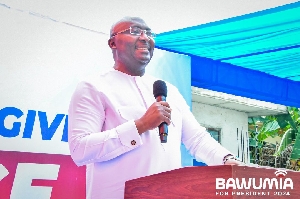Opinions of Sunday, 7 August 2011
Columnist: Bokor, Michael J. K.
If Rawlings smoked WEE and became Ghana’s President
… By Dr. Michael J.K. Bokor
E-mail: mjbokor@yahoo.com
Friday, August 5, 2011
… Does it follow that the NPP’s Nana Akufo-Addo too can do so, shrug off the allegation of drug pushing, and become Ghana’s President as suggested by his followers?
As the exchanges intensify on allegations that the NPP’s Akufo-Addo is a drug pusher, some of his supporters have advanced puerile arguments to suggest that even former President Rawlings also smoked marijuana (wee) but succeeded in becoming Ghana’s President. Thus, the stigmatization of their Presidential Candidate on that score won’t have any negative effect on his Presidential ambitions.
These buffs claim that if Rawlings could rule Ghana in spite of that stigma, the Fate that smiled on him will not discriminate against their idol. To them, therefore, whether Akufo-Addo pushes drugs or not doesn’t really matter in his hustings to become Ghana’s President at the 2012 polls. I have always been tempted to laugh such people to scorn and wished they knew how they were adding more fuel to burn their flagbearer’s image. I daresay that in this tandem, they are going nowhere but straight into a political ditch.
Such puerile arguments don’t hold water and won’t wash with me. I wonder whether these NPP elements couldn’t look for better ways to do the damage control that such allegations demand. They shouldn’t make the mistake to compare Akufo-Addo to Rawlings, both having emerged in different political periods with different political colorations and personalities to speak to the needs of different constituencies. Apart from the marked differences between their political careers and the trajectories of their involvement in national politics, a lot separates Akufo-Addo from Rawlings. Anybody who fails to recognize these fundamental differences will mislead himself into thinking that Akufo-Addo can brave the image-devastating storm and win the polls next year. Just because Rawlings is also guilty of what he is being accused of (drug pushing) doesn’t really solve his particular credibility problem on that score. There is a mismatch already. He may be full of himself and his “all-die-be-die” spirit, but the buck ends right there.
Rawlings is many light years ahead of Akufo-Addo, his shooting his way into the Osu Castle notwithstanding. That is why he preceded Akufo-Addo in realizing his dream to become Ghana’s Head of State, cutting across three different political periods—June 4 (AFRC era); December 31 (PNDC era); and January 7, 1993, to January 7, 2001 (NDC era). Akufo-Addo has remained at the fringes, nursing that ambition, and functioning in ways that haven’t helped him achieve his objective yet.
At best, for the 30 years now that he has been involved in national politics, he is still struggling to reach out successfully to the electorate for him to reach the pedestal. He has remained in the shadow of Rawlings, coming to notice mostly through militancy as a member of the defunct Alliance for Change in the era of Rawlings’ PNDC rule. Through the Alliance for Change’s series of impetuous public demonstrations variously known as “Ku me preko,” “Wie me preko,” and “Sie me preko,” Akufo-Addo couldn’t have made it into the limelight. He hasn’t been able to find his niche since then either.
Akufo-Addo may have the luxury of higher education and a law profession to boast of as against Rawlings “O” level and military career. But that advantage pales in the face of other politically relevant instances that favour Rawlings. What Rawlings lacks in higher education is compensated for by his assets: a natural charisma and ability to reach out successfully to the constituencies from where he drew (and still draws) massive support to remain in power for nearly 20 years. That is no mean achievement, to say the least.
Akufo-Addo’s record as a human rights activist isn’t that much alluring, given his performance as Minister of Justice and Attorney-General before Kufuor divested him of that portfolio. His claims to be fighting for human rights for 30 years now fly in the face of the shortcomings that have prevented him from coming across as credible. As Minister of Justice and Attorney-General under Kufuor, we saw the sordid things that happened under his watch—the most glaring one being the heinous murder of the Yaa-Naa (Yakubu Andani II) and the shoddy manner in which his office handled the matter.
We also remember how he contested the flagbearership of the NPP with former President Kufuor on two different occasions, losing all. We also remember how he lost the 2008 Presidential run-off despite winning the first round with a narrow margin. Something must have accounted for that reversal of fate. In his kind of checkered political history, he needs more than he is doing now to be able to persuade the electorate that he is their choice. And his followers need better strategies to whitewash him as such.
I expect Akufo-Addo to know that the kind of attention that countries and governments all over the world pay to drugs and drug-related issues these days is not the same as what happened in those days that Rawlings and co. might be smoking wee. These days, there is a more focused interest in tackling the drug menace; and knowing very well how Ghana’s image had been dented under the Kufuor government when the narcotic trafficking business flourished and Ghana served as a major transit point, anybody who is fingered as having drug problems immediately raises eyebrows. That’s why the Ghanaian electorate will be very happy for him to clear the air instead of leaving matters to his buffs to toy with. It won’t help him. Against this background, his supporters have a Herculean task on hand and must look for better ways to sell him than indulging in a cheap comparison between him and Rawlings when it comes to the allegation of drug pushing that is dogging him—and will continue to detract from his character for as long as he plays the ostrich. In that posture, he renders himself vulnerable for easy picking. His detractors will continue to poke him on his exposed backside until he lifts his head from the hot sand to face reality.
If he continues to dodge the issue, however, he shouldn’t be surprised when other allegations are trumped up and used to tarnish his image all the more. Once his detractors know how their allegations adversely affect him, they will hammer hard on them and disorient him with more insinuations. They know how to hurt him and will not relent until they completely shatter his reputation and render him unattractive.
At that point, he will come to realize that even though Ghanaian politics is indeed full of nonsense, it is not everybody who has the stomach to contain it that will survive and achieve his political ambitions. Rawlings did so and survived. Let Akufo-Addo stand on his own merit of character, then, to fight the electoral battle. Vain comparisons and contrasts won’t solve his credibility problem. To every man there comes a moment of decision. His has come now and he must use it to act tactfully in his own interest.
Those NPP supporters who react with insults and vain threats to anything we write to criticize their sacred cow should rather thank us for laying matters bare at this early stage. They will be helping themselves and their candidate if they look beyond their own parochial vested interests to see the other side of the coin. It is only then that their stitching in time will save nine for him. We challenge them to consider issues dispassionately and to do serious reflection so as to differentiate the food-for-thought that we give them from any tendency to cause mischief as they are quick to ascribe to our efforts. We will not be deterred by their insults or insinuations that we write the way we do about the NPP and Akufo-Addo because the NDC government is paying us to do so. If we were to be paid for all that we write, we would be riding on an Arabian Nights carpet by now. Ours is a yeoman’s job.












